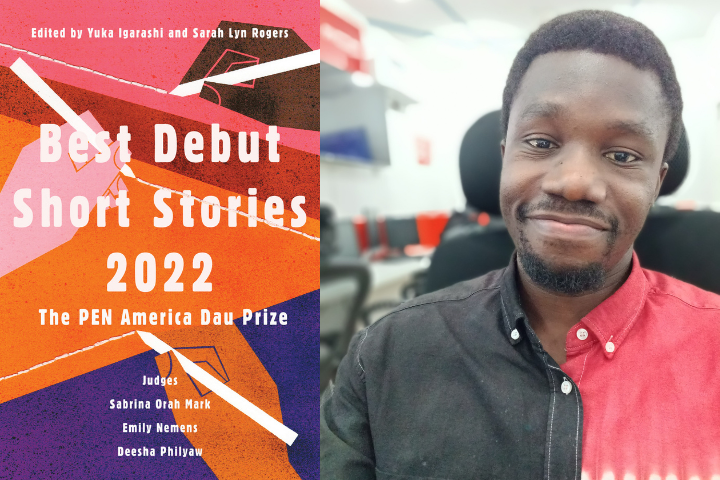An Interview with PEN/Robert J. Dau Prize Winner: Oyedotun Damilola Muees

In the upcoming weeks, we will feature Q&As with the contributors to this year’s Best Debut Short Stories anthology published by Catapult. These stories were selected for the 2022 PEN/Robert J. Dau Short Story Prize for Emerging Writers by judges Sabrina Orah Mark, Emily Nemens, and Deesha Philyaw.
Oyedotun Damilola Muees is a Nigerian writer who works as a Customer Success Executive. He writes contemporary, speculative fiction, and non-fiction about pop culture. He likes to explore various themes ranging from the queer, environment, war, culture, tradition, myth, and folklore. He has works published (and forthcoming) in Reckoning Press, Solarpunk, Tor.com, Clarkesworld, Lightspeed, and Science Fiction World. In his leisure time, you can find him reading, watching series, animation, horror, and crime movies, and surfing on Pinterest.
“All We Have Left is Ourselves” was originally published in Reckoning.
Here is an excerpt:
We are the ones who stuff heaps of garbage on the culvert, waiting for the waste trucks to come dispose of it. And when we don’t see them, we pray for the rain to come, tossing all our trash in the undulating flow. I see the juju man’s signature: the blood of the dead chicken on the three-road junction. The lifeless chicken, rotting on the road until the sun dries what is left of it. The opulent man is also guilty. He rubs his wealth on us all, building a mansion that extends, blocking the channel of water. The government appeals to the landlady of the sea, appeasing her with sacrifice.
What advice would you share with aspiring writers?
Treat writing like a daily routine. Read extensively. Find your genre(s) and stick with it. Have a writing mentor. Being better as a writer means writing, sending out your works, accepting rejections as part of the journey, and use it to finetune your story. Don’t assume your story isn’t good enough for a particular market, this is the job of the editors to decide.
Most importantly, pour out your heart in your writings. Let every iota of emotions run through the piece as the readers get fed by it.
What do you hope readers take away from your story?
I once read somewhere that a good story comforts the disturbed, and disturbs the comforted.
I want my readers bathed in the rain of awe, transported to places they haven’t been before vis-à-vis the story genre. I desire they have a feeling of optimism at the end of it.
What inspired you to write this story? Where did the idea come from?
Sometimes in April 2019 in Anambra state, I was serving there as a Youth Corper–a compulsory one-year service required for all graduates in Nigeria.
On this said date, some Corpers and I went for a hang out that evening. A heavy downpour made us linger at the location we visited. I later received a call from another Corper, saying flood water had entered into our lodge.
This was my first time experiencing such. That night was one that drilled dread in us. We feared that snakes would have been flushed out of their homes because our lodge was sharing spaces with the bush, and swim through the flood to attack us. Our foodstuff, books, shoes, few gadgets, mattresses, and clothes were affected by the flood. We had to sleep in another Corper’s room that day at about 1:47 am after we saved some items that weren’t damaged.
“All We Have Left is Ourselves” was heavily anchored on my experience that night and subsequently in that community. The community being a rural area had little intervention from the local government in terms of social provisions. They provided ways to reduce the massive flood in case it attacks again. Unlike the urban communities that enjoy smooth roads, stable electricity, good drainage system, proper refuse disposal, and others being the perks of being situated in a boti* area, where I lived was somewhat secluded from these benefits.
The people in my story only had themselves to make their community better, just like the people where I served. The Corpers and I told our Local Government Inspector about this experience, hoping to see how we could help them.
*The term “boti” is common slang in Nigeria that means someone who is from a wealthy home. Or a wealthy/rich person.
How has the Robert J. Dau Prize affected you?
Being selected as a winner has placed me a step higher than I was in the literary scene. I received two messages on Twitter from different literary agents, saying I can reach out to them whenever I have a full-length story I want to publish. More followers also (winks). Socially, I’ve got more engagement on Instagram where people ask me for writing tips on how to become a better writer.
The idea of home – our individual homes, but also our existence on earth – is a motif in this story. How does your own notion of home influence your writing?
My mother usually says that humans should always treat the ground with respect because she (the ground) is the one that will house our body when we pass away.
I engraved these words in my heart as a gentle reminder.
Home to me is a safe haven. A place where stories can be easily molded from the clay of experience, teachings, and happenings. It encapsulates the culture, tradition, attitude, behavior, and people inhabiting a settlement.
Being a self-taught writer, all that has influenced my writing are what I’ve experienced while growing up, daily happenings, environmental justice, politics and government, and bitter-sweet memories.






